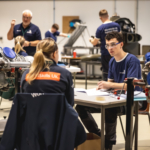We work to help inspire millions of young people to consider apprenticeships and technical careers as a prestige route to career and life success. However, I believe that we can’t fully succeed if we aren’t reaching young people from all backgrounds. Despite introducing a number of initiatives aimed at increasing the diversity of those who participated in our skills competitions programme, we are still failing to live up to our ambitions to be as inclusive as possible in our work.
That’s why, we commissioned research from The Social Innovation Partnership (TSIP) to look at our programme model to better understand the challenges and opportunities for inclusion so more young people and their employers get the opportunity to benefit from our work to improve skill standards. Over a 12-month period, almost 700 interviews were conducted with our network to understand what motivated people to participate in our competitions and understand the barriers, if any, they faced to entering. We also convened a research advisory group, made up of leading FE and industry spokespeople and inclusion experts, to help support and provide strategic guidance throughout the project.
The research found that the issues we faced with diversity and inclusion were reflected in the wider FE sector. Many colleges reported that they struggled to attract young people to non-traditional skills, which has a knock-on effect on those they entered into our competitions. We know we have an important role to play in tackling these existing stereotypes and pre-conceptions. At WorldSkills UK LIVE, our major annual skills and careers showcase, last year, 33% of young people arrived hoping to learn about apprenticeships and after watching their peers in the national skills competitions finals and speaking with the UK’s leading employers, colleges and training providers, 68% left planning to investigate apprenticeships as a career option. This shows how stereotypes can be addressed and the importance of peer role modelling in helping young people realise their full potential.
That’s why I am pleased that we are creating more opportunities at LIVE to showcase more inspirational role models by expanding the WorldSkills UK Diversity and Inclusion Heroes Awards. As our 2019 Rising Star Award winner Raisa Matadar from Jaguar Land Rover told me last week ‘you can’t be what you can’t see.’ By opening young people’s minds to all career possibilities, we are helping to create the pipeline for a more diverse, inclusive and productive workforce of the future which is integral to the success of the economy.
The research also confirmed that we need to work more closely with partners who are entering students and apprentices into competitions to help ensure the whole process is as inclusive as possible. After all, evidence shows that our competition activity is beneficial to all, with 97% of national finalists at last year’s LIVE saying they felt inspired for their future after competing, while 95% said their personal and employability skills had improved. By using this insight and undertaking positive action, we will detail more explicitly what we are looking for in those who are put forward to take part in our competitions and most importantly why we are looking to make these changes. I believe meritocracy, higher standards and inclusion are not mutually exclusive – this is about raising the bar and widening the gate.
It is my personal ambition that by 2025, members of Team UK who participate in WorldSkills will be more reflective of young people across the UK. To achieve this, we need to act today and work together to ensure the registration process for this year’s competitions, which closes on 2 April, is successful in tackling stereotypes and open to all: more young women in engineering and construction, more young men in hair, beauty and care services and in all skills more young people from disadvantaged areas, who are BAME and who identify as LGBT. Only then can we ensure we are selecting from a wider talent pool and the best and brightest young people, irrespective of their background, will represent the UK on the world stage.
I very much welcome the findings and recommendations from the comprehensive and ambitious report by TSIP– as a careers and skills development network with a global reach, as a convening platform for partners across the skill sector and as an employer. We are determined to make changes at WorldSkills UK and I hope those in the sector will commit to joining us, so together we can help more and more young people succeed.


